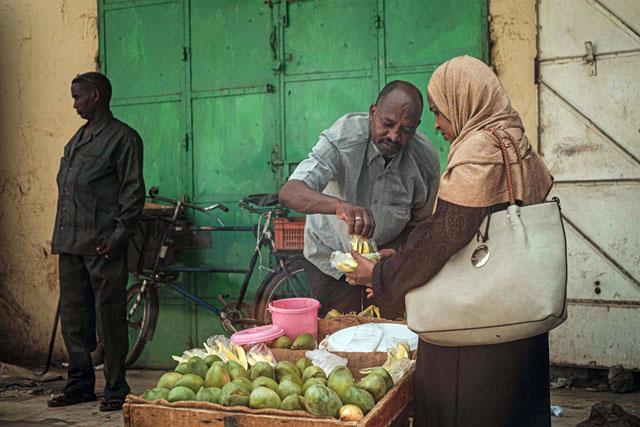You are here
US and African envoys push for Sudan solution
By AFP - Jun 14,2019 - Last updated at Jun 14,2019
KHARTOUM — US and African Union diplomats stepped up efforts Thursday to find a peaceful solution to a standoff between Sudan's protesters and generals following a deadly crackdown on demonstrators.
The diplomatic push comes after protesters demanding civilian rule called off a nationwide civil disobedience campaign and agreed to resume talks with the generals who ousted veteran leader Omar Al Bashir in April.
Traffic jams returned to downtown Khartoum and some shops in the capital's famous gold market began to reopen Thursday as more residents and office employees ventured out.
Fewer troops and members of the feared paramilitary Rapid Support Forces, who protesters and rights groups accuse of leading the June 3 crackdown on protesters, were on the streets in downtown Khartoum, according to an AFP correspondent who toured parts of the capital.
But they were deployed in force in the northern district of Bahari, a bastion of protests against the ruling military council.
Several parts of the city suffered electricity cuts early on Thursday, while Internet services remained erratic.
“Today is my first day to work after the campaign ended but I’m not in the mood to work,” said Suheir Hassan, an employee at a government office.
“Because, on my way I passed by the sit-in area and remembered that all those voices who used to chant revolutionary slogans have now disappeared.”
Protesters ended their disobedience campaign late on Tuesday and agreed to hold fresh talks with the ruling generals following mediation led by Ethiopian Prime Minister Abiy Ahmed.
Demonstrators launched the strike after men in military fatigues carried out a brutal assault on a sit-in of thousands of people outside the army headquarters last week, killing dozens.
Protesters brief US envoys
Washington and the AU, who have consistently pushed for civilian-led rule following Bashir’s ouster, stepped up efforts to find a solution on Thursday.
Washington’s newly appointed special envoy to Sudan, Donald Booth, along with US Assistant Secretary of State for Africa Affairs Tibor Nagy, were scheduled to meet Gen. Abdel Fattah Al Burhan, head of the ruling military council, on Thursday.
It was still unclear if the meeting took place.
Washington said Booth had been named to help craft a “peaceful solution” to the crisis that has rocked the northeast African country.
The Alliance for Freedom and Change umbrella protest movement said that its leaders briefed the two US officials on Wednesday on the need for a transparent investigation in the June 3 killings.
They also called for the withdrawal of “militias” from the streets in Khartoum and other towns, an end to the Internet blockade and the establishment of a civilian administration, it said in a statement.
The AU, which suspended Sudan following the crackdown, said global efforts were on to resolve the crisis.
“I can say without excess optimism that the discussions that we are holding with each side separately are moving forward to a great extent,” AU Special Envoy to Sudan Mohamed Al Hacen Lebatt told reporters on Thursday.
An international team of diplomats was working to resolve the crisis, he added.
Demand for guarantees
The US diplomats were also expected to meet on Thursday with top envoys of Saudi Arabia, the United Arab Emirates (UAE) and Egypt in Khartoum.
Experts say the three regional Arab nations appear to back the generals.
Days after Bashir’s overthrow, Saudi Arabia and the UAE offered a $3-billion aid package to Khartoum, including a $500 million cash injection into the central bank to help support the Sudanese pound which has plunged since last year against the dollar.
It was the country’s worsening economic crisis that first triggered the protests against Bashir’s iron-fisted rule.
Talks between the protest leaders and generals broke down in mid-May over disagreements on who should lead a new governing body — a civilian or a soldier.
Relations worsened following the crackdown, with protest leaders now insisting any agreement reached with the generals have “regional and international” guarantees for it to be implemented.
Sudan has been led by a military council since the generals ousted Bashir on April 11 after months of nationwide protests against his three-decade rule.
Protesters remained encamped outside the military headquarters in Khartoum for weeks afterwards demanding civilian rule, until the June 3 crackdown.
Around 120 people have been killed since then, according to doctors close to the protesters. The health ministry has acknowledged 61 people died nationwide.
Related Articles
KHARTOUM — The United States Wednesday named a special envoy to Sudan to find a “peaceful” solution between demonstrators and gene
KHARTOUM — Shops and restaurants began to reopen in Sudan's capital Wednesday after demonstrators called off a nationwide civil disobedience
KHARTOUM — Sudanese protest leaders said Saturday that an Ethiopian envoy mediating with the ruling generals has proposed forming a civilian


















